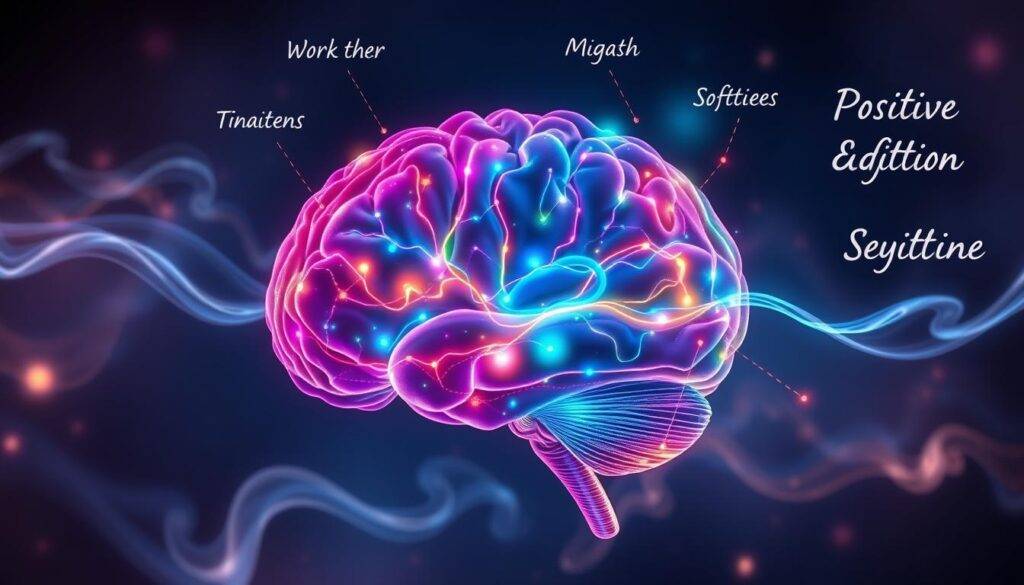“The mind is everything. What you think, you become.” – Buddha
This quote from the Buddha shows how our thoughts shape our lives. Our subconscious mind handles 95% of our thinking. This makes positive self-talk and intentional thinking very powerful. Affirmations, or chosen thoughts, can change our brain’s pathways, a process called neuroplasticity.
Using affirmations can change your brain’s paths. It can remove bad thoughts and bring in positive ones. In this article, we’ll look at how affirmations can change your life. They can help you control your subconscious mind and lead to a better life.
Key Takeaways
- Your brain has an incredible capacity for change through neuroplasticity.
- Thoughts contain energy that can strengthen or weaken neural pathways.
- Affirmations can uproot negative thought patterns and cultivate a more positive mindset.
- Consistent repetition of affirmations is crucial for rewiring the subconscious mind.
- Integrating affirmations into your daily routine can lead to intentional and successful living.
Understanding the Power of Neural Plasticity and Thought Patterns
The human brain is amazing, able to change and adapt called neuroplasticity. It can make new connections, helping us learn and grow. Affirmations, a tool for self-improvement, use this to change our thoughts and behaviors.
What Neuroplasticity Tells Us About Brain Changes
Neuroplasticity lets our brain change its structure and function. This happens due to our actions, environment, and brain processes. Cognitive Behavioral Therapy (CBT) helps change negative thoughts by creating new connections.
How Thought Patterns Shape Neural Pathways
Our thought patterns deeply affect our brain’s wiring. Thinking the same things over and over makes them automatic. Affirmations can create new connections for positive beliefs and goals.
The Role of Repetitive Thinking in Brain Structure
Repetition is crucial for understanding affirmations’ effect on the brain. Positive or negative thoughts strengthen certain pathways. This can change the brain’s structure over time.

“The brain is a lot like a muscle – the more you use it in the right way, the stronger it gets.”
By using our brain’s neuroplasticity and understanding thoughts, affirmations can change our brain. This helps us reach our goals.
Can Affirmations Reprogram Your Brain?
Affirmations can change your thinking patterns through cognitive restructuring. This method helps you swap out negative thoughts for positive ones. It uses the brain’s neuroplasticity to help you change for good.
The Science Behind Cognitive Restructuring
A 2016 study in the Social Cognitive and Affective Neuroscience journal showed something cool. It found that saying nice things to yourself turns on the brain’s reward centers. This leads to the release of happy hormones like dopamine and serotonin. Over time, this builds new paths in your brain for confidence and happiness.
How Self-Talk Influences Brain Chemistry
Hal Elrod has a 3-step plan for making affirmations work. It involves setting goals, understanding why they matter, and taking steps to achieve them. This method fits how our subconscious mind works, making affirmations a strong tool for change.
Evidence from Neuroimaging Studies
- Studies show that positive self-talk activates parts of the brain that handle good feelings and rewards.
- Self-affirmations help you feel more positive and adaptable, even when faced with challenges.
- Regularly using positive affirmations can lead to lasting benefits by creating new brain paths for better mental and physical health.
By using affirmations, you can tap into the brain’s ability to adapt and grow. This helps you develop a more positive and resilient mindset, ready to reach your goals.

The Impact of Positive Self-Talk on Brain Function
Positive self-talk, like using affirmations, deeply affects your brain. It turns on your brain’s reward system, making you feel better and more motivated. This repeated action changes how your brain handles information, helping you pick up new habits.
Studies show that self-affirmation calms down brain areas linked to stress. This can lower your stress, making you more confident and resilient when facing tasks.
People who use positive language in their self-talk tend to face challenges with a growth mindset. This mindset boosts resilience, motivation, and openness to feedback. It also helps you notice mistakes and improve your control over your thoughts.
Mental imagery, combined with positive self-talk, can make your brain think it’s experiencing joy. This is a great way to change your brain and build a more positive mindset.
The effects of positive self-talk on your brain are clear. By using affirmations and mindful self-talk, you can unlock your brain’s full potential for growth and success.
“Positive self-talk decreases stress and anxiety levels, while negative self-talk spikes them.”
The research shows that positive self-talk can change your brain and unlock your potential. By adopting a growth mindset and being kind to yourself, you can overcome challenges, build resilience, and reach your goals with confidence.
| Statistic | Insight |
|---|---|
| Positive affirmations can lead to increased activity in key brain regions associated with self-processing and reward. | Engaging in positive self-talk activates the brain’s reward system, leading to increased well-being and motivation. |
| Individuals who use strong, positive language in their self-talk are more likely to approach tasks with confidence and resilience. | A growth mindset developed through positive self-talk promotes increased resilience, motivation, and openness to feedback. |
| Mental imagery activates the same neural pathways as actual experiences, promoting joy, happiness, and delight when paired with positive self-talk. | Combining positive self-talk with mental imagery can be a powerful tool for rewiring the brain and cultivating a more positive mindset. |
| Participants who engaged in positive self-talk by telling themselves they were excited before a test scored 8% higher and felt more confident of their results. | Positive self-talk can improve cognitive performance and boost confidence, leading to better outcomes. |
The power of positive self-talk is undeniable. By embracing this mindset shift, you can unlock your brain’s full potential and achieve success in all areas of your life.
How the Subconscious Mind Processes Affirmations
Your subconscious mind is incredibly powerful. It stores everything that happens in your life, acting like a personal hard drive. It doesn’t care if what it remembers is true or not. By using affirmations daily, you can stop thinking on autopilot and choose better thoughts.
Understanding the 95% Subconscious Activities
Studies show that your subconscious mind uses about 95% of your brain’s power. The conscious mind only uses 5%. This means most of your thoughts, feelings, and actions come from your subconscious. By practicing affirmations regularly, you can change your mental programs. You can replace negative thoughts with positive ones.
Breaking Free from Autopilot Thinking
Many of your daily actions are controlled by your subconscious mind. It works on autopilot a lot. Affirmations help you take control of your thoughts and actions. With effort and patience, you can change your brain’s patterns and think differently.
Creating New Mental Programs
Your subconscious mind works like a computer program, shaping your beliefs and actions. By using positive affirmations, you can change your subconscious. This can lead to big changes in how you think and live, helping you achieve your dreams.
FAQ
Can affirmations reprogram your brain?
Yes, affirmations can reprogram your brain. They are thoughts you choose to think. This uses your conscious mind to change your subconscious.
Through neuroplasticity, your brain can change at any age. Affirmations can remove negative thoughts and plant positive ones.
What is the science behind cognitive restructuring with affirmations?
Science backs affirmations for changing behavior. A 2016 study showed affirmations activate the brain’s reward centers. Hal Elrod’s 3-step approach matches how our subconscious works.
This makes affirmations a strong tool for changing behavior.
How do affirmations influence brain chemistry and function?
Positive self-talk, like affirmations, boosts well-being and motivation. Studies show it activates the brain’s reward system.
Neuroimaging studies also found self-affirmation reduces stress. It lowers activity in brain areas linked to stress.
What role does the subconscious mind play in processing affirmations?
The subconscious mind stores everything, like a personal hard drive. It doesn’t tell fact from fiction. It remembers what it’s told, good or bad.
Affirmations help break free from autopilot thinking. They let you choose your thoughts. This creates new mental programs and replaces negative thoughts with positive ones.
How does neuroplasticity enable the brain to be rewired through affirmations?
Neuroplasticity lets the brain change by forming new connections. Affirmations use this to train the brain to accept new realities.
Regularly using affirmations changes how the brain processes information. This makes it easier to adopt new habits and behaviors.




























































